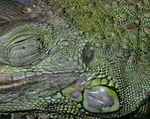Difference between revisions of "Lizard Ear"
| Line 8: | Line 8: | ||
==Anatomy== | ==Anatomy== | ||
| − | The ear has auditory and vestibular functions. In many lizards the external ear is greatly reduced and most species have a superficial tympanum. Exceptions include geckos and monitors which have external ear canals. | + | The lizard ear has auditory and vestibular functions. In many lizards the external ear is greatly reduced and most species have a superficial tympanum. Exceptions include geckos and monitors which have external ear canals. Iguanids have a tympanic membrane which is nearly contiguous to the surface of the skin whereas it is deeper and recessed in scincids (such as the blue-tongue skink) and agamids (such as the bearded dragon). |
There is a single ossicle, the columella. Middle and inner ears and eustachian tubes are present. | There is a single ossicle, the columella. Middle and inner ears and eustachian tubes are present. | ||
Revision as of 00:02, 24 February 2010
| This article is still under construction. |
Most of the lizards seem to hear in the same range as the green iguana (500 to 4,000Hz range), with a sensitivity peak at 700 Hz, equal to about 24 dB. For lizards lacking a tympanic membrane, such as the lesser (Northern) earless lizard (Holbrookia maculata), hearing is limited to lower frequencies.
Gekkonids who vocalize have both high sensitivity and high frequency, up into the 10,000Hz range.
Anatomy
The lizard ear has auditory and vestibular functions. In many lizards the external ear is greatly reduced and most species have a superficial tympanum. Exceptions include geckos and monitors which have external ear canals. Iguanids have a tympanic membrane which is nearly contiguous to the surface of the skin whereas it is deeper and recessed in scincids (such as the blue-tongue skink) and agamids (such as the bearded dragon).
There is a single ossicle, the columella. Middle and inner ears and eustachian tubes are present.
